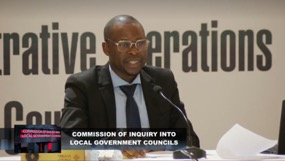
The Basse Area Council 2019 Audit Report covers 31 December 2017 to 2018.
Mr Trawally appeared yesterday for the second time following his first appearance before the Commission to shed light on the local government audit reports.
Testifying before the Commission, Mr Trawally said that according to the Local Government Act, there shall be a general council and related sub-committees to which responsibility will be delegated for oversight functions to ensure proper monitoring mechanisms over the executive branch (CEO and Team).
He, however, told the Commission that during their assessment, they found out that sub-committees mostly remained inactive. He added that no reasons have been advanced for the status quo, adding that the management failed to indicate any action to be taken.
“There was no adherence to the work compliance,” he testified, adding that there was no apparent adherence to punctuality.
The Commission also heard that there was an attendance book but few signed and that there was no evidence also that the registration was monitored.
“Our assessment of the control environment of the councils reveals that there was no apparent commitment to attendance and punctuality to work. There is a register in place for attendance but there was no evidence to show that it’s subjected to monitoring to ensure adherence,” the witness testified.
He added that they were told of a memo about punctuality and attendance sent to all staff but that memo was never provided.
Witness Bakary Trawally added that staff of the council and indeed some of the management staff do not appear to be aware or conversant with the requirements of the working documents applicable to them, adding that most processes and procedures appear to take place on ad-hoc basis rather than in accordance with the prescribed provisions of the working document.
We realised that you see people in positions and when you go to their files, you will not see qualifications. He also added that such were even sometimes heads of departments and units. He added that it was clear that stakeholders were not consulted in the hiring of service.
Mr Trawally raised the lack of opportunity to work with the Service Commission to sort out the hiring and staffing process in councils.
He elaborated that he did not formally reach out to the Service Commission but had been informally making requests and follow-ups for them to work with the National Audit Office, adding that hiring is really a problem in councils.
Moreover, the witness also acknowledged the underreporting of revenue amounts collected. He stated that collectors were also collecting revenue and spending the money, adding that when they were asked by the auditors, their response was that they were instructed by the director of finance to make payments
The witness furthered that they later engaged the management of the Basse Area Council, and they said they had instructed the director of finance to desist from that, but there was no evidence provided to confirm that there were such instructions.
Testifying further, Mr Trawally acknowledged that an amount of D25,030 was not accounted for during the period under review. The other receipt books that were given to collectors were not submitted to the council. Thus, he said auditors could not know the amount collected and do not also know whether the revenue collected was banked or not.
Mr Trawally also explained the issue of expenses not acknowledged, which he said entails revenue collectors making a number of payments out of the collections that were not acknowledged by the receiving cashier. The collectors, he explained, claimed making payments ordered but there was no evidence of the payments made.
Continuing his testimony, per the Basse Area Council Audit Report, he also admitted assets value and purchase costs were not identified, actual locations were not specified for all assets and not all assets were recorded in the register, amongst others.
The Commission also heard that there was no comprehensive payroll register, citing discrepancies between position, grade and position.
Mr Trawally added: "We realised that fuel has just been used and there is no fuel registered. The evidence of the availability of fuel register has not been provided.
He also delved into the issue of payment without supporting documents, single source procurements (which did not comply with GPPA guidelines), non-maintenance of petty cash, inappropriate payments, unaccounted tickets and revenue-earning books, expenses not acknowledged, amongst others.
Hearing continues tomorrow.




